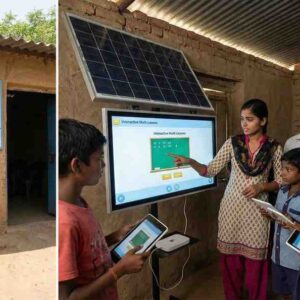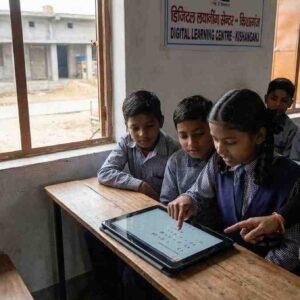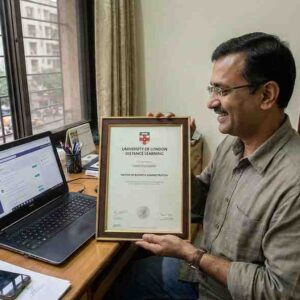Examining the Balance Between Tradition and Modernity in Uttar Pradesh’s Education System
Lucknow– Education is not just a means to impart knowledge; it is a tool to shape societies and prepare individuals for the future. In Uttar Pradesh, the challenge lies in harmonizing traditional values with modern demands, creating a system that equips students for a rapidly evolving world. With a blend of ancient wisdom, emerging technologies, and contemporary challenges, are we truly preparing the next generation for what lies ahead?
Key Metrics
- Literacy Rate: Uttar Pradesh’s literacy rate stands at 73%, below the national average of 77.7% (Census 2011).
- Digital Learning Reach: Over 50 lakh students have benefited from the state’s Digi Shakti Program, which distributes tablets and smartphones (UP Education Department, 2023).
- Enrollment Figures: Primary school enrollment exceeds 90%, but dropout rates remain high at 14.6% in secondary schools (Unified District Information System for Education Plus (UDISE+) Report).
- Budget Allocation: Uttar Pradesh allocated ₹54,883 crore for education in 2023-24, focusing on infrastructure and digital learning initiatives.
Education Through a Philosophical Lens
1. Ancient Roots of Indian Education
The traditionalGurukul system, which emphasized holistic learning, integrated moral values, practical skills, and spiritual development.
- Core Philosophy: The Gurukul approach prioritized the pursuit of wisdom over mere accumulation of knowledge, fostering creativity and critical thinking.
- Modern Parallel: Efforts to integrate yoga, meditation, and value-based education in schools echo these principles.
2. Gandhian Educational Philosophy
Mahatma Gandhi’s vision ofNai Talim (Basic Education)emphasized hands-on learning and self-reliance.
- Relevance Today: Vocational training programs in Uttar Pradesh, such as Skill India, reflect Gandhi’s call for practical education aligned with local needs.
3. Ambedkarite Focus on Equality
Dr. B.R. Ambedkar championed education as the cornerstone of social justice and empowerment, particularly for marginalized communities.
- Impact: Government schemes like Pre-Matric and Post-Matric Scholarships for SC/ST students aim to address historical inequities.
Modern Challenges in Uttar Pradesh’s Education System
1. Digital Divide
While digital education initiatives have gained momentum, rural areas still face barriers in connectivity and access.
- Data Insight: Only 38% of rural households in Uttar Pradesh have access to the internet, compared to 68% in urban areas (TRAI Reports, 2023).
2. High Dropout Rates
Secondary school dropout rates remain alarmingly high due to economic pressures, early marriages, and inadequate infrastructure.
- Impact: Girls, in particular, are disproportionately affected, with 28% leaving school before completing secondary education (ASER Report, 2022).
3. Curriculum Gaps
The focus on rote learning over critical thinking and creativity hampers students’ ability to adapt to modern challenges.
- Employability Concerns: A 2022 survey found that only 47% of graduates in Uttar Pradesh were deemed employable for industry jobs.
Initiatives Shaping the Future of Education in Uttar Pradesh
1. Digi Shakti Program
The state’s flagship digital learning initiative aims to bridge the technological divide by providing tablets and smartphones to students.
- Outcome: Benefiting over 50 lakh students, the program has improved access to online education and skill-building resources.
2. Operation Kayakalp
Focused on improving school infrastructure, this initiative has upgraded40,000 schoolswith better classrooms, drinking water facilities, and toilets.
3. Skill Development and Vocational Training
Programs underSkill Indiahave trained over2 million youthin Uttar Pradesh, equipping them with job-ready skills.
4. NEP 2020 Implementation
The state has begun aligning its curriculum with theNational Education Policy 2020, emphasizing multilingual education, vocational training, and holistic development.
Balancing Tradition and Modernity in Education
1. Reviving Ancient Wisdom
Incorporating traditional practices like yoga, storytelling, and moral education can nurture emotional intelligence and cultural awareness.
- Example: Schools in Varanasi have introduced yoga as a mandatory subject, drawing from the city’s rich spiritual heritage.
2. Fostering Critical Thinking
Modern pedagogical methods, such as project-based learning and experiential education, are being piloted in urban schools to replace rote learning.
3. Equity and Inclusion
Ensuring equal access to quality education for all sections of society remains a priority.
- Government Focus: Initiatives like free textbooks, uniforms, and bicycles for girls aim to reduce gender disparities in education.
Philosophical Reflections on Preparing for the Future
- Education as Liberation
- Inspired by Ambedkar’s belief, education must empower individuals to overcome societal barriers and achieve personal freedom.
- Learning as a Lifelong Journey
- The Gurukul philosophy underscores that education extends beyond classrooms, emphasizing adaptability and curiosity.
- Harmony Between Skills and Values
- As Gandhian thought suggests, education must balance technical skills with moral and ethical grounding to build well-rounded citizens.
Conclusion: A Roadmap for the Future
Uttar Pradesh’s education system is at a pivotal moment, tasked with preparing students for a future that demands innovation, adaptability, and resilience. By blending ancient philosophical insights with modern pedagogical practices, the state can create an education model that is both inclusive and forward-looking.
The ultimate goal must be to cultivate individuals who are not just academically proficient but also socially responsible, ethically grounded, and equipped to navigate the complexities of an ever-changing world.









